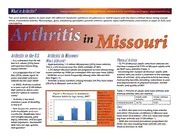
Arthritis in Missouri 2009 PDF
Preview Arthritis in Missouri 2009
What is Arthritis? Missouri Department of Health & Senior Services - Missouri Arthritis and Osteoporosis Program - www.moarthritis.org The word arthritis applies to more than 100 different rheumatic conditions of unknown or varied causes with the most common forms being osteoar- thritis, rheumatoid arthritis, fibromyalgia, gout, ankylosing spondylitis, juvenile arthritis, systemic lupus erythematous (also known as lupus or SLE), and scleroderma. Arthritis in Missouri Arthritis in the U.S. Arthritis in Missouri • It is estimated that 46 mil- Who’s Affected? Physical Activity lion U.S. adults (22%) have • Approximately 1.4 million Missourians (32%) have arthritis. •16.7% of Missouri adults who have arthritis are self-reported doctor-diag- This is a 6% increase over the 2003 estimate of 30% inactive compared to 9.9% of Missouri adults who nosed arthritis1 • 1.72 million Missouri adults are projected to have doctor-diag- do NOT have arthritis (Table 1) • It is projected that 67 mil- nosed arthritis by 2030 (an estimated 25% increase from 2005)4 •Increasing the number of Missouri adults with lion (25%) adults aged 18 • Arthritis occurs more frequently among older Missourians arthritis who are active is essential in the manage- years and older will have (See Figure 1) ment of arthritis, since physical activity has many arthritis by the year 20301 • Arthritis is more common among females (34.9%) than males noteworthy benefits including: reductions in pain (28.6%) in Missouri and in the US and improvements in physical function, mental • In 2003, Arthritis resulted health, and quality of life2 in a total cost of $128 billion ($81 billion in direct costs Table 1: Percent of adults who have arthritis and and $47 billion in indirect Figure 1 il- Figure 1: Prevalence of Arthritis in without arthritis who are inactive costs)2 lustrates that Missouri Adults by Age Group, 20073 Adults with Adults without arthritis is more • Arthritis is the most 70% 64% common among I IA rthritis IA rthritis I common cause of disability ults 60% Missouri adults Percent Inactive 16.7% 9.9% •in Rthisek Ufa.cSt2o rs for arthritis are Missouri Ad 4500%% 41% aolgdeedr. 6 T5h ea nlodw - C•o Isnt 2003, the total cost resulting from arthritis bmootdhi fmiaobdleif.i aMboled iafinadb lneo rnis-ks: ntage of 2300%% 15% eosf ta prtrhevriatilse nisc e amnodr eo tthhearn r $h2e.u8m bailtliioc nco 5 n(Tdhiteio Un.sS i.n to Mtaisl scoousrti rwesausl t- oinvjeurrwy,e inigfhect/toiobne,s aitnyd, joocinctu pa- Perce 10% fboert wMeisesno tuhreia angs es ing from arthritis was $128 billion.2 ) 0% • With the increased prevalence projections for tional exposures. Nonmodifi- 18-44 45-64 65+ of 18 and 44. 2030, the cost resulting from arthritis will con- able risks are age, gender, tinue to increase as well and genetics1 Arthritis in Missouri Arthritis and Weight What’s Happening in Missouri Works Cited • Among Missouri adults with arthritis 72% are • Missouri has seven Regional Arthritis Centers (known 1 National Center for Chronic Disease overweight or obese compared to 58.4% of Missouri as RACs). See map below for RAC locations Prevention and Health Promotion (2008, adults without arthritis • From July 2007 to June 2008, Missouri offered a total October 15). Data and Statistics. Re- trieved January 7, 2009, from Arthritis: • Reducing the prevalence of overweight/obesity of 830 evidence-based courses throughout the state in http://www.cdc.gov/arthritis/data_sta- among Missouri adults who are diagnosed with partnership with the RACs tistics/index.htm specific types of arthritis can help reduce the de- • Starting in July 2008, Missouri will be modifying the velopment and symptoms of those conditions. For evidence-based course selection to include Arthritis 2 Centers for Disease Control and Pre- vention. (2008, July). Targeting Arthritis example, weight control can lower a person’s risk for Foundation Exercise Program, Arthritis Foundation . Retrieved January 7, 2009, from At a developing osteoarthritis, and weight loss can reduce Self-Help Program, Chronic Disease Self-Management Glance 2008: http://www.cdc.gov/nccd- symptoms for people with knee osteoarthritis2 Program, and EnhanceFitness php/publications/aag/arthritis.htm#aag Arthritis and Other Chronic Conditions 3 Centers for Disease Control and Pre- vention (2007). Tables 1-4, Behavioral • 61% of Missouri adults with diabetes also have Risk Factor Surveillance System, 2007. arthritis • 66% of Missouri adults with cardiovascular disease 4 Centers for Disease Control and also have arthritis Missouri Arthritis Program -Regional Arthritis Centers Prevention (2007, June 22). Morbidity and Mortality Weekly Report. Retrieved • 52% of Missouri adults with hypertension also have January 8, 2009, from Errata: Vol. 56, arthritis * No. 17: http://www.cdc.gov/mmwr/pre- • 50% of Missouri adults with high cholesterol also view/mmwrhtml/mm5624a5.htm have arthritis 5 Centers for Disease Control and Pre- • With so many of Missouri adults reporting these vention (2007, January 12). Morbidity conditions also reporting being diagnosed with * and Mortality Weekly Report. Retrieved arthritis, it is important to address the unique barri- January 7, 2009, from National and ers that having arthritis presents to participating in State Medical Expenditures and Lost Earnings Attributable to Arthritis and physical activity, especially since physical activity is Other Rheumatic Conditions --- United often recommended to individuals who have these States, 2003: http://www.cdc.gov/ co-morbidities as a strategy for management2 mmwr/preview/mmwrhtml/mm5601a2. * htm To print additional copies of this fact sheet INSTITUTE ,r please visit www.moarthritis.org PUBLIC POLICY —Regional Arthritis Center flurry S Tr11m11n School of P11blic Affairs This publication was supported by CDC Grant/Cooperative Agreement Number 03022, Missouri Arthritis & Osteoporosis Program & Behavioral Risk Factor Surveillance System, Cooperative Agreement Number u58/ccu722795–04. Its contents are soley the responsibility of the authors and do not necessarily represent the official views of CDC. Alternate forms of this publication for persons with disabilities may be obtained by contacting the Missouri Depart- ment of Health & Senior Services at 800.316.0935. Hearing & speech impaired citizens telephone 1.800.735.2966. voice To TEACH. To SERVE. To DISCOVER 1.800.735.2466. An equal opportunity/affirmative action employer services provided on a nondiscriminatory basis.
